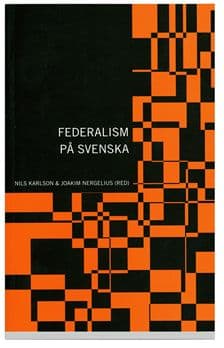Federalism på svenska
Abstract
I resten av Europa och övriga världen har för- och nackdelar med ett mer federalt styrelseskick diskuterats sedan länge. Så dock inte i Sverige, trots att begreppet federalism har stor relevans för den pågående politiska debatten om förändringar i den svenska kommunala och regionala strukturen, liksom för diskussionen om det sjunkande politiska deltagandet och offentlig sektors bristande effektivitet. Syftet med antologin FEDERALISM PÅ SVENSKA är att råda bot på denna brist.
I FEDERALISM PÅ SVENSKA analyserar tio statsvetare, jurister, historiker och nationalekonomer federalismens möjligheter och tillkortakommanden i dagens Sverige. Vad innebär federalism och hur skulle ett mer federalt statsskick kunna fungera i Sverige? Måste verkligen alla kommuner och landsting följa samma regler och vad händer om de inte gör det? Bör regelverket för kommundelars utträde underlättas och göras mer rättssäkert? Vilka är effekterna av den kommunala skatteutjämningen på det lokala företagsklimatet och arbetskraftens rörlighet? Hur kan vi dra lärdom av den finska utvecklingen? Vad kan vi lära av andra europeiska federala staters likheter och olikheter? Och hur sannolik är egentligen en federal utveckling för Sveriges del? Det är några av de frågeställningar som behandlas utifrån nya, stimulerande och ibland även motsatta perspektiv.
Karlson, N. & Nergelius, J. (Eds.) (2007). Federalism på svenska. Stockholm: Ratio.

MEDVERKANDE:
Johan Almenberg
Niclas Eklund
Gissur Ó Erlingsson
Nils Karlson
Anders Lidström
Lisbeth Lindeborg
Joakim Nergelius
Siv Sandberg
Erik Wångmar
Jörgen Ödalen
REDAKTÖRER:
Nils Karlson &
Joakim Nergelius

